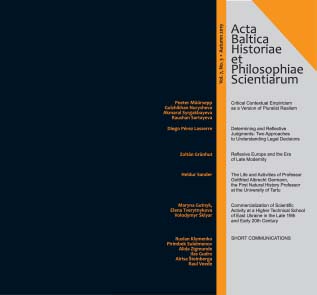The Philosophical Basis of Al-Farabi’s Concept of ‘Virtuous City’
The Philosophical Basis of Al-Farabi’s Concept of ‘Virtuous City’
Author(s): Pirimbek SuleimenovSubject(s): Political Philosophy, Social Philosophy, Middle-East Philosophy
Published by: Tallinna Tehnikaülikooli õiguse instituut
Keywords: Al-Farabi; ‘Virtuous City;
Summary/Abstract: Al-Farabi’s full name is Abū Naṣr Muḥammad ibn Muḥammad ibn al-Fārābi Uzlağ ibn Tarkhan. His birthplace is the ancient Kazakh city Otrār, which Arabs called Bārāb-Fārāb, hence the name Abū Naṣr al-Farabi means “Abū Naṣr from the city of Fārāb”. Sometimes he was simply called Tarkhani. Abū Naṣr started his education at an early age, studying in his hometown Otrār, and then moved to Khorāsān. Later, to improve his knowledge, he went to Baghdad, the cultural centre of the Arab world, where he studied under highly educated people. For example, he studied medicine and logic under the Christian scientist Yuhanna ibn- Haylan, and natural sciences and Greek language from the well-known translator Abū Bashar Matta. It is also known that al-Farabi had a good relationship with the famous scientist Abubakar bin Siraj—al-Farabi taught him logic and learnt astronomy from him. Al-Farabi was mainly self-taught and a self-determined and successful person. He focused on Greek science and philosophy, and Aristotle’s rich legacy. He was fluent in Turkish, Arabic, Persian, Greek and other foreign languages (Khairullaev, 1975, p. 152). Iranian researcher Majdi Sanay (2001) argues that Iranian politicians subdivide the Islamic scientific culture into three main directions: (1) the philosophy of al-Farabi, (2) the concepts of Nizam-ul- Mulik, and (3) the concepts of Fazollah and Rozbehan Khodzha.
Journal: Acta Baltica Historiae et Philosophiae Scientiarum
- Issue Year: 7/2019
- Issue No: 3
- Page Range: 147-157
- Page Count: 11
- Language: English

